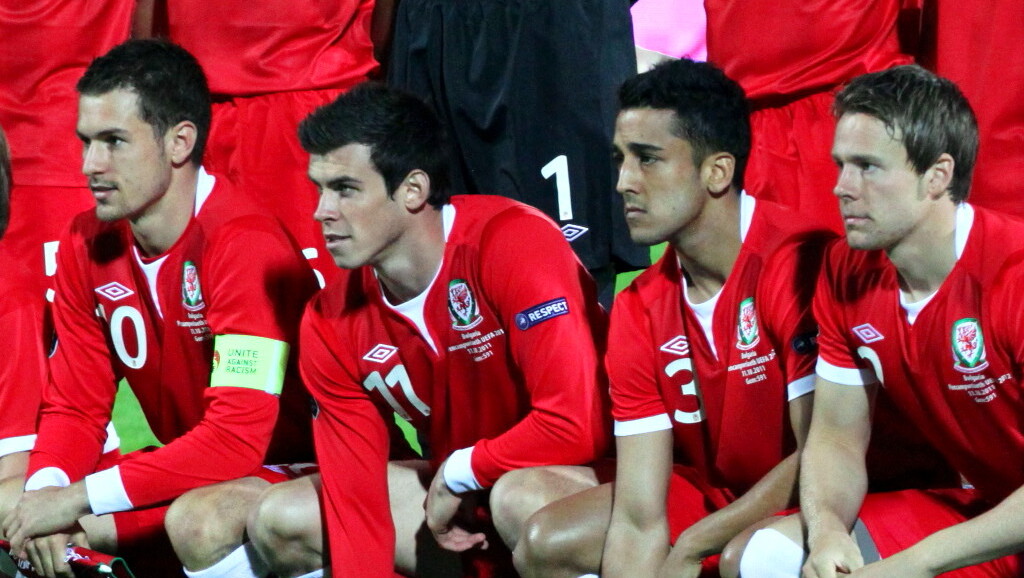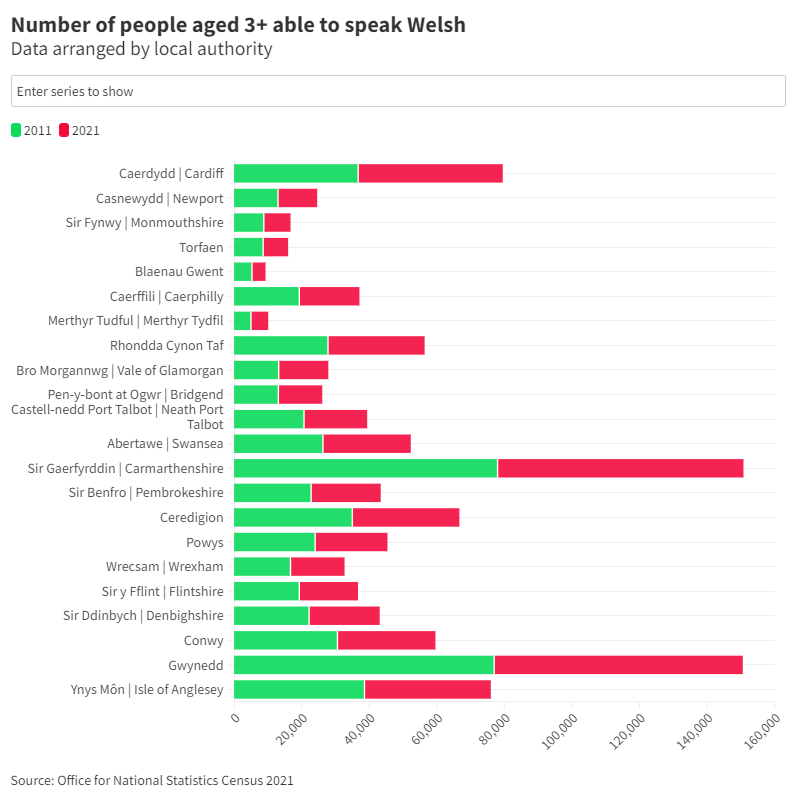As Wales aims for one million Welsh speakers, we take a look at a case study of Welsh learner turned online personality, Stephen Rule, to find out the secrets to learning and what the diagnosis for Welsh is for the future.
Stephen Rule sits at his computer in a red jersey. Something, he admits, is not an uncommon occurrence, “I’m mostly found in some sort of football shirt,” he says. Whether for his home nation of Wales or his home town of Wrexham it doesn’t matter – after all both are on the up these days. “Everyone knows where Wrexham is now,” he says, after the team was taken over by Hollywood actors, got promoted, and even starred in its own Disney Channel documentary.
The Wales men’s team saw success too when they headed to the Fifa World Cup in Qatar – their first in 64 years. That, however, came after a long period of struggle. “In the early 2000s, they essentially got rid of the old guard and they brought in all these young lads at the same time. And they were getting battered,” says Stephen, “then they came together as this one group. And they’re still seeing success from that.”
Despite his passion, Stephen isn’t a football pundit, he’s a Welsh learner turned Welsh teacher, turned Welsh personality, Dr Cymraeg. He writes books about the language, is a moderator for the Welsh Duolingo course, and is even raising his son in a Welsh-speaking home. He has, it is no exaggeration to say, had his whole life changed by the language.
He mentions football for a good reason though. For him, the plight of the Welsh football team mirrors another home grown challenge – preserving and regenerating the Welsh language. “There has to be like a catch-22 generation for this to come back,” says Stephen, “we are the people who have to be that sacrifice, we have to be that young Welsh team.”

That sacrifice may take on different forms – from sending a child to Welsh school, encouraging children to take Welsh seriously, or speaking a few words of Welsh here and there. “If there were more places for it [Welsh], that be there’d be more of a chance for it,” Stephen says. But he insists inroads being made. “We’re making it a part of our lives, you know, we’re chucking a “diolch” (thank you) at the end of our text, we’re, you know, we’re saying “Penblwydd Hapus” (Happy Birthday) on someone’s Facebook wall, you know, we’re buying a “Nadolig Llawen” (Merry Christmas) cards, we’re making that change.”
After all, if one comeback was made on Welsh soil – surely there’s room for another. “The Welsh team’s proven that if you stick together and you stick at something,” he says “you can really bring it together.”
Stephen’s Welsh learning journey started in a fairly unremarkable fashion like many other children who grew up in Wales– at school. Attending English medium schools in Flintshire in the 90s and 2000s, he was part of one of the first generations affected by a change that saw Welsh integrated into the national curriculum under the Education Reform Act 1988. This meant it became a compulsory subject for all learners in Key Stages, 1, 2, and 3 from 1990, and then Key Stage 4 in 1999.
While Stephen found that every interaction he had with the Welsh language was “positive”, this wasn’t the case for his peers, as many of them found Welsh lessons “to be a bit of a drag”. But while it is easy to blame the teachers, Stephen thinks more responsibility lies with the students. “I think there’s now this kind of even cliche these days, where the teachers the scapegoat,” he says, “I think sometimes we do have to look at ourselves. Because I don’t ever remember a teacher being a bad teacher.”
But it’s not just Stephen’s friends who didn’t fall in love with the language. According to statistics from the 2021 census, the decrease in the number of Welsh speakers is “mainly driven by a fall among children and young people”. For someone to learn Welsh there has to be an “initial desire”, according to Stephen. Which, for him, was one part naivety, one part talent, and a sprinkling of wanting to prove people wrong.

For someone to learn Welsh there has to be an “initial desire”, according to Stephen. Which, for him, was one part naivety, one part talent, and a sprinkling of wanting to prove people wrong.
This mix of desires led him to Wales’ first University, Aberystwyth, where, Stephen found himself in the deep end. It turns out the Welsh Stephen knew was textbook, not how people really spoke and it was only as an adult he really started to learn. Luckily, his father got him a job at the local hardware shop where the first requisite was to “siarad Cymraeg” or speak Welsh. This wasn’t unfair, he says, but necessary as “the people who came in there were 80% Welsh speaking”.
Over the two years he worked there his progress was swift. “I tell you what, the language there was bonkers. A lot of farmers would come in, and I learned that sort of language,” says Stephen. “I’m glad I did it. Because I don’t think I’d have really picked up and appreciate the language as much as I have now. The best way to do it is to throw yourself into it.”
And while it was scary and overwhelming at times, he saw Welsh in the wild for the first time. It made him feel vindicated, he says: “This thing that I’ve decided I love is real”. He then jumped into teaching, both to children at an English-medium school for over a decade and also to adults. On the adults’ motivations, he says: “Some do it just for work. And that’s okay. “Some do it because they feel like they missed out in school and they possibly could have tried a bit harder and some have moved to Wales. Some want to bring up family and Welsh. The reason is less important than dedication. “Don’t worry what your reason is,” he says, “I think if you can find one if you can find a reason for it, cling to it with everything you’ve got.”
I want it to show them that they can have a laugh with this language, you can say funny things.”
Stephen Rule
Doctor Cymraeg is how many Welsh learners would know Stephen online. Known by his avatar of a man wearing a white lab coat with a Welsh badge, a stethoscope wrapped around his neck, and holding a clipboard, he can prescribe solutions to many Welsh language problems.
One of his latest tips includes getting learners to think of Welsh word associations. “GWELD = to see It used to be GWELED, hence why its stem is GWEL-; e.g., GWELON NI = we saw. I used to remember this one by wondering how anyone could SEE through a WELDing mask. Get it?!”
Dr Cymraeg started as a way for him to connect with people and share tips about learning Welsh.“It became this platform of helping people,” he says. There are jokes, grammar tips, Duolingo help, or sometimes “random things”. It’s not only a good way to help people or raise the profile of Welsh, but it helps connect him with others, he says: “It’s good to have the army of people who are clearly as passionate as I am.”
Though he’s a Welsh whizz online Stephen has a home life too – one where he’s still very much the learner. He lives with his family near Wrexham, with his wife and his son. He admits he doesn’t always understand everything his mother-in-law is saying – but it’s up to about 90% now.
Raising his son as a first language Welsh speaker has brought up new challenges, after all learning Welsh at University doesn’t teach you nursery rhymes in Welsh or how to teach easy-to-understand commands. “It’s been another learning curve on the multitude of learning curves of a language and it’s just cemented for me that I will always be learning,” says Stephen.
After everything he’s learned and all he’s seen – how can you make other learners develop a passion similar to his? Unfortunately, there’s no simple answer. “I think if the answer was easy, I think we’d have probably done it already,” he says, “we’re all different people.
Despite this Dr Cymraeg’s diagnosis for the language is a positive one. He prescribes use of the language – and doses are on a case-by-case basis.
“Even if the extent of your language is a “diolch” in the shop and maybe a “bore da” here and there. If that’s the extent of your language, then flipping use it, you know, because it’s, it shows us who we are,” he says. “People who built our lovely nation spoke this language,” he says, “it’s [a] testament to them that we keep that going. It’s one of the only things that makes us unique.
“I’ve got this faith in us as a generation,” he says, “We may never be fluent ourselves, we may well get to this point where we can have a bit of a chat.” And just like the football team, “I think we are willing to take that hit. Whether we’re conscious of it or not, I think we’re naturally doing that. And that’s cool.”
